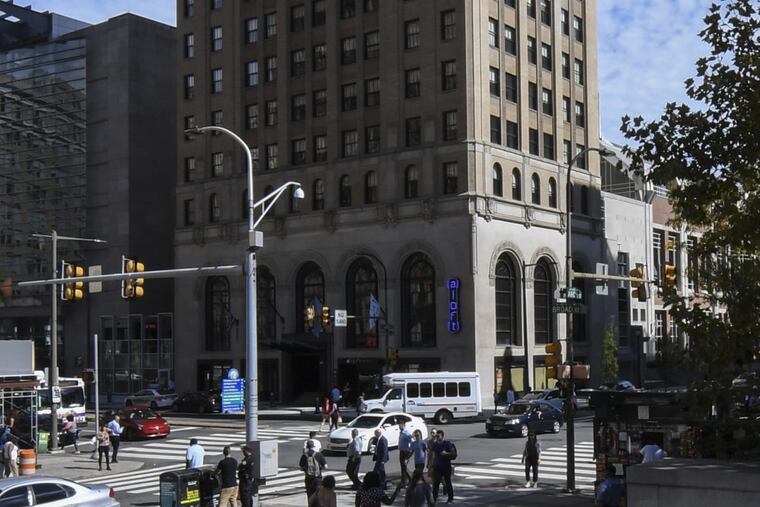Philly union presses pension funds re: nonunion hotel (Updates)
Investors say their nonunion hotel employs mostly lower-income workers.

Supporters of Unite Here Local 274 have been mobilizing political support to pressure public pension funds not to invest in a New York fund they say is backing the developer of a Center City convention hotel staffed by nonunion workers.
The 2,500-member local, which represents hotel, restaurant, and other workers in Philadelphia, says the Starwood Aloft at Broad and Arch Sts. was built with public subsidies from government economic development programs designed to help poor people, but questions whether the hotel is actually doing so.
But hotel investors says the Aloft employs already employs lower-income workers, most of them African Americans from Philadelphia.
In a five-page summary report to the $50 billion Pennsylvania Public School Employees' Retirement System and the $5 billion Philadelphia City Board of Pensions, the union notes that Almanac's Realty Securities Fund VI has committed $200 million in recent years to developer HRI Properties of New Orleans. HRI is the majority owner, along with Dennis Maloomian's Realen Properties of King of Prussia, of the 179-room hotel, in a long-vacant former financial-company tower at Broad and Arch Streets.
The union urges investors to put pressure on Almanac to review what the union calls the risks of funding HRI, at a time when Almanac's Fund VIII is trying to get pension funds to invest millions more with the company.
The Unite Here report notes the Aloft project has collected government funding commitments, including $15 million in federal New Markets Tax Credit financing, which is supposed to go to projects that help improve low-income communities, but has been threatened with defunding by Republicans in Congress after reports it has been used to subsidize luxury projects.
The hotel was also approved for $2 million in matching grants from Pennsylvania's Redevelopment Assistance Capital Funding program, City Councilman Mark Squilla (D-1st) noted in a separate letter supporting the unionists and asking investors not to invest more in Almanac. (Update Wednesday:) "The $2 million has not been drawn down," David Smith, a spokesman for the Pennsylvania Department of Community and Economic Development, said Wednesday.
The unionists say the developers were awarded this money targeted to economic-development projects, even though they didn't promise to focus on jobs for low-income workers. They quoted from a letter U.S. Rep. (and city Democratic leader) Bob Brady (D. Pa.) wrote to U.S. Secretary of the Treasury Steve Mnuchin noting that Brady is "deeply troubled" to see federal tax credits targeted to helping poor people used to build a high-end hotel in one of the city's richer neighborhoods without any "agreements" to "ensure a hiring pipeline from low-income neighborhoods."
(Update Tuesday:) In a written statement, HRI and Almanac said the hotel's workforce of 100 "direct and indirect" employees includes 86 percent Philadelphia residents, and also 78 percent African Americans, with 11 "multi-race," 10 "Caucasian," and 2 Hispanic. The companies said they had "partnered" with Philadelphia Works Inc., a nonprofit skill development and placement group, "to identify, recruit and train locals in partnership with HRI Lodging and Marriott International." The statement added that the companies paid "living wages," and added that they expect there will be more workers on site when four vacant store spaces are rented.
In a letter to investors that references the union campaign, sent by Amanac managing partner Matthew W. Kaplan and managing director Josh K. Overbay, the Almanac investors credit their partner HRI with having "redeveloped a chronically vacant, environmentally contaminated, hazardous eyesore into a new, job-creating hotel attached to the Pennsylvania Convention Center," with jobs "created for low-income residents," as the New Markets program requires.
They confirm the more than 100 workers at the hotel aren't represented by a labor union, but add that the hotel was built by contractors employing union labor. (Squilla notes another 100-plus workers were supposed to get jobs at a hotel restaurant that has not materialized.)
What will the pension funds do? While Philadelphia "unfortunately" agreed when it invested with Almanac's Fund VI that it will not "exit the fund early," Philadelphia now "has no plans to approve any additional investment," city finance director Rob Dubow told Squilla's office and United in an Oct. 19 email provided by the union.
(Update Tuesday:) Philadelphia hadn't planned to invest in Almanac's Fund VIII even before it heard from the union, city spokesman Mike Dunn told me. He said the city had actually invested a total of $9.4 million into Fund VI since 2012, and received back $6.9 million so far, valuing what's still invested at $16.2 million, for a total yearly annual return of 16.2 percent, roughly twice the fund's annual total target.
PSERS will consider its own investment in Almanac's Fund VIII at a meeting in Harrisburg on Thursday. PSERS officials weren't immediately available for comment Monday evening.
(An earlier version of this story included a smaller room count based on pre-construction plans for the hotel.)